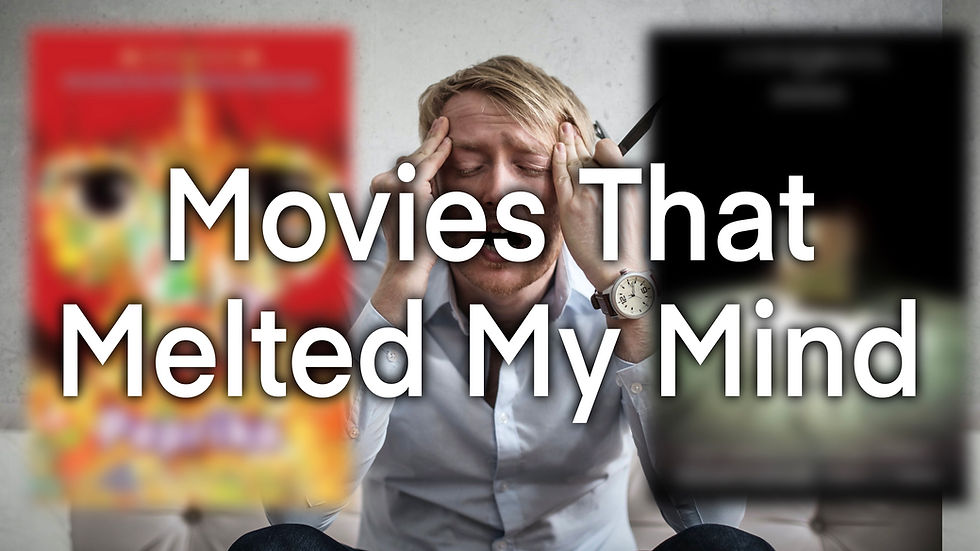Books On Filmmaking That I Wish I Read Sooner
- Oct 29, 2023
- 5 min read
This year, I had a major realization that sparked a New Year's resolution and though it may seem obvious, it hadn't hit me before. I realised that all the incredible filmmakers and writers I respect speak the same cinematic language. WHO KNEW? They have all watched or read the same books. They have all learned from the greats that came before them, and that made me realise that I need to learn more about the foundation of filmmaking. So, I decided to read as many of the best filmmaking books I could find.
I looked through lists and lists of books, reading their descriptions, trying to find which books were best for me. And by noting the books that feature on multiple must-read lists, and watching interviews of my favourite directors: I feel I have created the ultimate filmmakers reading list.
There is a lot of book on my list, so I still have plenty to read, but these 7 that I have listed here: have truly changed the way I view cinema as a whole. Reading these has influenced my filmmaking to such a degree that I wish I had read them years and years ago!
If you haven‘t read these then you better get started!
Filmmaking/Inspiration:
These books not only taught me a great deal about the craft of filmmaking but also reinforced my belief that there's nothing quite like creating movie magic.
Sidney Lumet - Making Movies

After seeing this in a making-of video posted by David F. Sandberg, I knew I had to read this book. A renowned director for decades, Lumet's writing is just as passion-filled and well-crafted as his films. It offers an incredible insider's view of the industry, for me, redefining what it is to be a film director. Learning of Lumet's approach to collaborating with crew and performers, coupled with his dedication to storytelling, was an invaluable lesson. While some aspects may reflect a dated era, I found practical tips in this book that I directly applied to my own film projects straight after reading them.
Akira Kurosawa - Something Like An Autobiography

A master of the filmmaking craft, as both director and writer, this book tells the story of perhaps the most influential filmmaker of modern cinema. Kurosawa entertains his readers with personal tales of his traditional upbringing in Japan whilst also offering endless wisdom on the art of film. Kurosawa stresses that to be a good director you must first be a good writer, as your job, is to tell a story. His love for writing, and unwavering dedication is like that of a character in one of his own films. I did not know much about this legend before reading it, but I sure do now!
Robert Rodriguez - Rebel Without a Crew

Do you like a success story? Well, Robert Rodriguez's is one of the best ones around. Unfortunately, the world just isn't the same as it was when Rodriguez turned his $7000 (which he earned from a human drugs trial) into a million-dollar career. But that doesn't mean it still can't happen. This book won't just fuel your passion to follow your dream and make movies. It will give you a lot of first-hand ideas of how to cut corners creatively to achieve the essential things that your film needs. This book breaks the idea that films have to be perfect and that you have to study at a prestigious school or have a massive budget to make your movie successful. Those things are great, yes, but what you need more than those, is persistence and belief. With that, you can go anywhere.
Walter Murch - In The Blink of an Eye

I'd say a man who edited 1.25 million feet of film for Apocalypse Now, knows a thing or two about editing. Before I picked up a camera I downloaded iMovie. Editing is what sparked my love for filmmaking, and reading this book, written by a truly masterful film editor, taught me so much that I never knew before. Although the digital world is very different, the art of it remains the same. Murch talks about how and why he cuts his films the way he does, informing the reader of an almost magical technique. Which once you learn, you'll not be able to watch a film without noticing that they are using it too! A must-read for any editor.
Screenwriting:
I thought I knew a lot about writing. But after reading these I realised I knew nothing before!
Syd Field - Screenplay

For me this is the definitive book on Screenwriting. This book preaches a beautiful balance between formulaic structure and creative freedom that should be read by everyone. This book opened my eyes to writing in a way McKee and Snyder couldn't do; because they were either too technical or too simple. Syd Field was an expert in writing and, even better, an expert in teaching people how to write. With superb examples, tips and tricks, Field will help you create a story that's authentically you and one that'll also entertain the masses. He explains his recommended process in great detail, and honestly, the knowledge that this book contains is priceless. I loved every second of it!
Robert McKee - Story

This is a genuine warning! Deciding to read this book is the scriptwriting equivalent of choosing between the Red and Blue Pill. Once you read this mind-blowing masterpiece you'll never even think of a film idea the same way again. McKee's in-depth analysis of scriptwriting blew my mind, and as complicated as it may be, when everything he was saying finally added up, I was gobsmacked! From beats to scenes to sequences to acts to stories: McKee will tell you everything you could possibly want to know about screenwriting. His takes on genre, character and story structure are game-changing!
Blake Snyder - Save The Cat




Comments